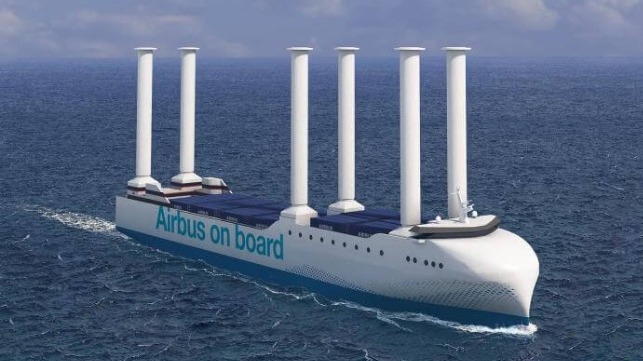Airbus and Louis Dreyfuss Order Three Wind-Assisted Cargo Ships from China

European aviation company Airbus working with French shipping company Louis Dreyfus Armateurs (LDA) is moving forward with their plan to launch three new ro-ro cargo vessels with wind-assisted propulsion. A division of LDA signed an order on January 2 to build the three vessels with China’s Wuchang Shipbuilding, a division of China State Shipbuilding Corporation (CSSC) with delivery to begin in 2025.
Airbus and Louis Dreyfus Armateurs announced the plans for the three vessels in October 2023 highlighting that they would not only greatly increase the capacity to transport aircraft components for Airbus but at the same time dramatically reduce carbon emissions. Airbus’ goal is to reduce emissions from its Atlantic ships by 50 percent by 2030 compared to a 2023 baseline, cutting the total emissions from 68,000 to 33,000 tons.
The vessels are larger than the current ships owned by LDA and chartered to Airbus, but at the same time use an innovative design. Each will be equipped with two dual-fuel methanol-fueled main engines as well as two dual-fuel methanol-fueled auxiliary engines. Initially, they expect the vessels to operate on marine diesel transitioning to e-methanol. Further reducing emissions with be six Flettner rotors. Wuchang also highlights that they will be equipped with an energy-saving optimization management system.
Emissions from the vessels when they begin entering service in 2025 are expected to be 11,000 tons of CO2 annually by 2030. As they increase the use of e-methanol, emissions will fall to 5,000 tons each by 2040 for the three new ships.
Compared with the three current cargo ships operating for Airbus, the new vessels will have a larger carrying capacity design to support Airbus’ plan to increase production of its A320 class of planes to 75 aircraft per month by 2026. The new vessels will have the capacity to transport around 70 40-foot containers and six aircraft subassembly sets. This will include wings, fuselage, engine pylons, and horizontal and vertical tails. Airbus has said any excess capacity could be used by other divisions or its partners.
After delivery, the ships will operate trans-Atlantic transporting the components between Airbus’ production base in Saint-Nazaire, France, and its aircraft assembly line in Mobile, Alabama. Two of the existing vessels, Ciudad de Cadiz and City of Hamburg, will be retired while the third, the Ville de Bordeaux, will move to operations in the Mediterranean.
The ships are part of a pioneering effort to use advanced designs for the shipping industry and are part of an overall plan to reduce emissions. Another French operation recently commissioned the Canopée (5,500 dwt), which is being called the first hybrid industrial vessel. It is equipped with collapsible wing sails and is being used to transport assemblies for the European Space Agency’s Ariane program between Europe and the launch facility in French Guiana. A third French company, Zéphyr & Borée, was believed to have ordered five containerships that also feature wingsails.
No comments:
Post a Comment